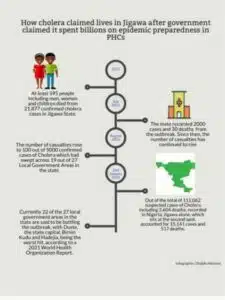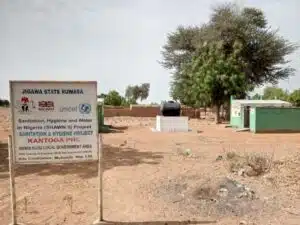In 2021, at least 500 people out of 10,000 confirmed cases of Cholera were reported dead. Currently, twenty two out of the 27 local government areas in Jigawa are vulnerable to the disease. This is despite the billions of naira the state government said it has invested in the healthcare sector, particularly primary healthcare. In this investigation, Arinze Chijioke reports on how the parlous state of primary healthcare and poor epidemics preparedness is contributing to high morbidity and mortality rates in Jigawa state.
As each day passes by, Mariya Sabo misses her husband.
“All that is in the past now, everything has changed, “Sabo said. “I don’t know how to cope without my husband, he was the best I could ever ask for.”
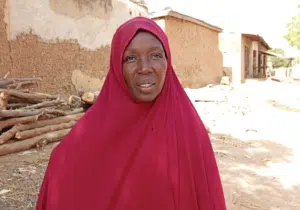
One morning in July 2021, at exactly 1 am in Kantoga, one of the villages in Birnin Kudu local government in Jigawa State, Sabo’s husband, Musa woke up and started vomiting. At first, she thought her husband was reacting to some food he had when he stepped out the previous day. But he soon started stooling too and this time, she was bewildered and did not know what to do. Unknown to her, he was down with Cholera –an acute diarrhoeal infection caused by ingestion of food or water contaminated with the bacterium Vibrio cholera.
Nigeria deserves the best, Osinbajo tells APC delegates in Jigawa
Kano/Jigawa customs command generates over 14 billion revenue
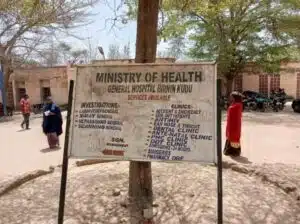
When she and her husband got to the hospital, the health workers on ground told them that they had run out of drugs and the oral rehydration therapy needed to treat him.
Immediately, they were referred to the Birnin Kudu General Hospital but before they left the Kantoga PHC, Musa’s condition had deteriorated.
At exactly 8 pm that same day, he died.
“When the doctor told me that my husband had died, I felt my world had come to an end. If he had received the attention he needed at our community PHC, he would not have died,” Sabo recounts her husband’s death.
Now, the thought of how to take care of her children troubles Sabo every day. While her husband was alive, he worked hard to fend for the family. He farmed and owned a grinding machine.
“I am finding it difficult to take care of my eight children alone.
“None of them is working yet and that means I must work hard every day to put food on the table.”
The Jigawa Cholera outbreak
Musa’s story is not isolated. He is only one out of at least 595 people including men, women and children who died from 21,877 confirmed cholera cases recorded in the state in 2021.
Since July 2021, when the state recorded 2000 cases and 30 deaths from the outbreak, the number of casualties has continued to rise, even as the disease continues to ravage communities in the state.
In August, 2021 for instance, the number of casualties rose to 100 out of 5000 confirmed cases of Cholera which had swept across 19 out of 27 Local Government Areas in the state, with Hadejia recording the highest number of cases.
Out of the total of 111,062 suspected cases of Cholera including 3,604 deaths, recorded in Nigeria as at 2nd January 2022, Jigawa alone, which sits at the second spot, accounted for 15,141 cases and 517 deaths.
Currently 22 of the 27 local government areas in the state are said to be battling the outbreak, with Duste, the state capital, Birnin Kudu and Hadejia, being the worst hit, according to a 2021 World Health Organization Report.
Yahya Idris was full of life and zest when he was leaving home on a Tuesday in July 2021. He had gone to harvest some crops for the family, including his wife and aged mother who was staying with him.
But when he came back, he started complaining about his tummy and suddenly started stooling and vomiting. Immediately, his family took him to the Kantoga PHC. But like it was in the case with Sabo’s family, the hospital could not help because there were no drugs.
His family brought him back home and started giving him traditional medicine, hoping that he will get better. But that did not work and he later died at 11pm.
“We did not have any other alternative since the hospital could not attend to us,” Idris’ aged mother, Amina said, with tears rolling down her cheeks.
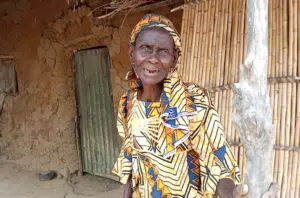
Now, Amina misses her son whom she describes as her favourite.
“It has not been easy with his absence, he was always there for me and the entire family, “she said. “But I am grateful because my other children are trying to take care of me.
She said her son would not have died had the hospital attended to him when we got there.
In Bamaina, another village in Kantoga LGA, where the former governor of the state, Sule Lamido hails from, over 198 cholera cases were confirmed and eight deaths recorded in 2021.
Mai’Ugwa, who doubles as the chairman of the committee set up to monitor the state of facilities at the Bamaina PHC said that the hospital did not have the required medical supplies at the early stages of the outbreaks.
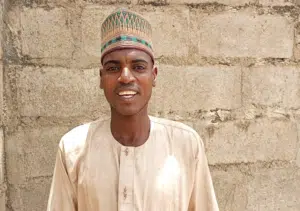
Head of Bamaina
“It was when the government saw that it had become serious and that our people were beginning to die that they stepped in, supplying oral rehydration therapy and drugs to help people survive, “he said.
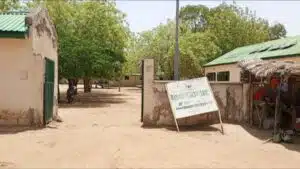
In Hadajia, it was a harvest of death
Halima Salisu has been left with the burden of catering to the needs of her 12 children after she lost her husband to Cholera in April 2021.
According to her, he had woken one morning in their house in Gabari, one of the communities in Hadejia and started vomiting. She did not know what the problem was and waited for some time to see if he would get better before seeking health care. But he did not and soon, he started stooling too.
At 12pm, she took him to the Gabari Primary Health Centre. Sadly, there were too many patients waiting to be attended to. The PHC was overwhelmed.
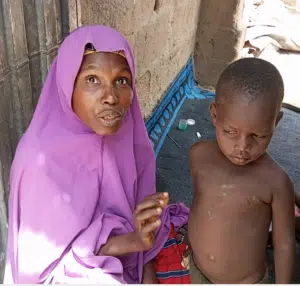
“We could not wait and had to bring him home. At exactly 8 pm, he died leaving me with our children to cater for”, she said.
Salisu is only one out of many residents of Gabari who were thrown into mourning due to the rate of Cholera related deaths in 2021. Abdullahi Adamu, a health worker at the hospital said the outbreak was unprecedented.
“It got to a point where at least two people were dying every day with patients trooping to the PHC from the 8 LGA makes up the Hadejia emirate and the facilities available to take care of them were not enough,” Adamu recalled.
He explained that the hospital had to hastily discharge patients who had partially recovered to admit patients who had worse conditions adding that the hospital lost over 51 people to Cholera in 2021, most of whom were women between the ages of 20 to 50.
He noted that while the government tried to provide drugs needed to treat patients, they frequently ran out of antiseptics and disinfectants they were using to disinfect wards and beds where some patients died.
One of the community heads in Gabari, Mai Nasiru said they worked together as a community and hardly slept at night during the outbreak because of how devastating it was.
“We were always going to bury our fathers, mothers and children who died following the outbreak, even though we made efforts to ensure that we did not lose our people to the outbreak. We were working with our hospital to ensure that they had everything they needed to treat people”.
At the Kofar Arewa PHC in Gagulmari community, Hadejia LGA, at least 10 people died following the outbreak, including three from one family in 2021.
Ibrahim Mohammed, a health worker at the hospital, told Solacebase that most families in the community lost their loved ones following the outbreak which was not serious at first.
“At the onset, the cases were only trickling in and we had drug supplies and oral rehydration therapy from both the local and state governments as well as partners which were enough. Soon we ran out of supplies and we were overwhelmed,” he said.
Government’s intervention not yielding results
Although cholera outbreak is often linked to poor access to clean water, open defecation, poor sanitation and hygiene, experts say the increasing rate of deaths in Jigawa state is occasioned by the failure of the government to invest in Primary Healthcare.
While the state government claimed it spent billions of naira over the years on epidemic preparedness to protect residents from epidemics such as Cholera, residents in rural communities who are most vulnerable still lacked access to healthcare.
Investigations by Solacebase have shown that most PHC facilities in the state lack the capacity to provide essential healthcare services, in addition to having issues such as inadequate equipment, poor staffing and distribution of health workers, poor condition of infrastructure and lack of essential drug supply.
In 2018 for instance, the state government said it spent a total of ₦160 million on disease control programmes. In 2021, the state government spent ₦431 million on the same purpose. This is apart from the billions of naira it claims to have spent on the upgrading and provision of drugs and other medical supplies for Primary Health Centres in the state.
Ward Development Committee Chairman of Kantoga, Umaru Suleiman said that the outbreak of Cholera across communities in the state showed the extent to which PHCs –which are closest to the people –are lacking basic facilities required to take care of residents’ medical needs.

“We lost many of our children to the Cholera outbreak, partly because our PHC in Kantoga was incapable of taking care of those who were down with it,” he said. The workers were overwhelmed and they did not have the drugs to take care of victims.
He confirmed that apart from the Birnin Kudu General Hospital where people were referred to on several occasions, the centre had to also refer people to the Federal Medical Centre, Dutse.
District Head of Kantoga, Danasabe Musa said that while he appreciates the government for providing medical supplies at Birnin Kudu, it is important to make sure that local hospitals are well equipped to take care of such crisis when they arise, so people don’t always have to travel long distances to get healthcare.
Cholera outbreak is not peculiar to Jigawa state. It is a global phenomenon. For instance, the World Health Organization estimates that there are roughly 1.3 to 4.0 million cases of Cholera and 21 000 to 143 000 deaths worldwide annually.
In Nigeria where Cholera is endemic, there has been an increase in reported cases since June 2021. A total of 111,062 suspected cases including 3,604 deaths were recorded as at 2nd January 2022 according to a report by the Nigeria Centre for Disease Control (NCDC), with the vast majority cases concentrated in Bauchi, Jigawa, Kano, Zamfara, Sokoto and Katsina states.
The report showed that these numbers put the case fatality rate at 3.5%, which is higher than the previous annual outbreaks in the past four years, with the outbreak affecting 32 of the 36 states in Nigeria, including the federal capital territory Abuja.
Handling Cholera outbreak requires huge investment in the primary healthcare sector. Sadly, in Jigawa State, healthcare financing remains a major problem which affects healthcare delivery at the grass roots level.
Dr. Bashir Abubakar, Community Engagement Manager at Nigerian Health Watch said that the government has not made the right investment in PHCs in the country as reports have it that only about one-third of the 30,000 PHC facilities across Nigeria are working.
He noted that the inability of PHC centers to provide basic medical services to the Nigerian population have made both secondary and tertiary health-care facilities experience an influx of patients.
“Because of lack of adequate staffing and poor infrastructures, most PHCs open between 9 am and 2pm and if there is any emergency, people must transport themselves to the cities to get healthcare, “he noted.
“Sometimes, you go to Federal Medical Centre and General Hospitals and you find women receiving antenatal services which is the purview of PHCs.”
He explained that although management of PHCs constitutionally falls within the jurisdiction of the local government, poor funding due to the skewed federal allocation system in the country and lack of prioritization of healthcare by the local government administrators has rendered most of the PHCs ineffective.
As was the case during the peak of the cholera outbreak, PHCs across local communities had to wait for medical supplies to attend to patients, a situation which mirrors the county’s political arrangement that makes local government the weakest.
State health ministry reacts
While testimonies from families who lost loved ones suggest that the Jigawa State government failed in its duty of ensuring that PHCs in the state were adequately prepared to tackle the Cholera outbreak, the state government says it did everything it could to tackle the outbreak.
Permanent secretary of the Jigawa State Ministry of Health, Salisu Mua’zu said that the state government was working to forestall a recurrence of the outbreak and casualties recorded.
He explained that the state government had organised a training for staff in the ministry’s public health and monitoring department to arm them with the required knowledge on how to handle outbreak of epidemics such as Cholera.
In April, he was quoted as saying that the state vaccinated 946,325 and 904, 169 in Birnin Kudu, Dutse and Hadejia local government areas against the disease in 2021, adding that the ministry had also set up a response to reduce the number of deaths from the disease in 2022.
Moving forward
On the way forward, Abubakar said that there is the need for more health facilities and upgrading of existing ones and that will begin with the strengthening of the local government system in Nigeria.
He maintained that LGs must be financially autonomous to be able to provide basic health services to the people, adding that there is also the need for strong accountability in the system whereby money meant for healthcare delivery are accounted for even as services rendered will be monitored.
“If we begin to get the Primary Healthcare system right in Nigeria, a lot of our healthcare indices, such as high maternal and child mortality, outbreak of disease epidemics will be dealt with” he said.
As each day passes, residents like Sabo hope that the government will take healthcare seriously and stop the spate of needless deaths in rural communities in Jigawa state.
This publication is produced with support from the Wole Soyinka Centre for Investigative Journalism (WSCIJ) under the Collaborative Media Engagement for Development, Inclusion and Accountability project (CMEDIA) funded by the MacArthur Foundation.
Solacebase initially publishes this story.


